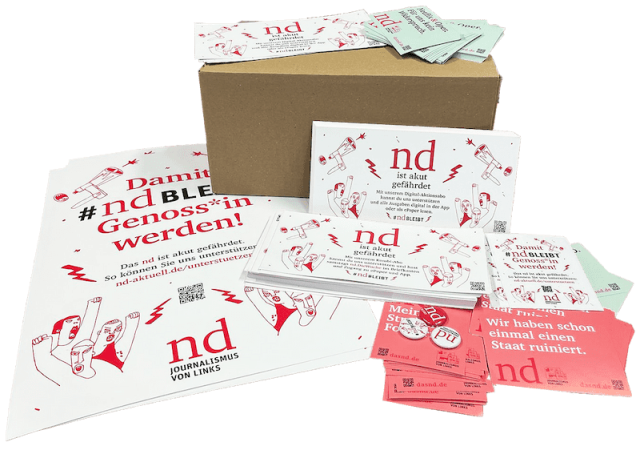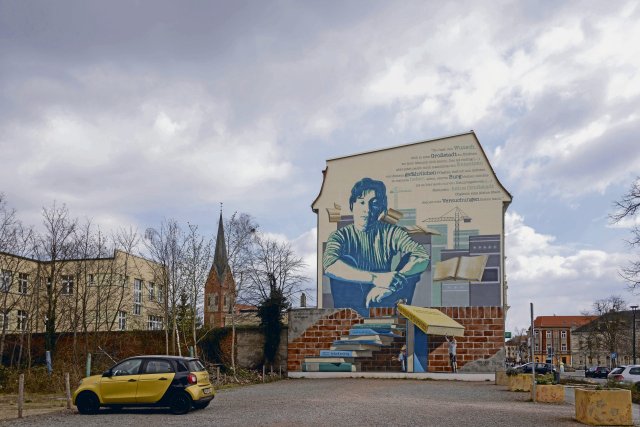Books that are out of line: Mural for Brigitte Reimann in her birthplace Burg, Saxony-Anhalt
Photo: IMAGO/imagebroker
Should you publish everything that is found in the archives, especially if it is a popular author? In the case of Brigitte Reimann’s unprinted stories, editor Carsten Gansel made the right decision. They are lyrics full of youthful energy that spark and fire you up. What was still a literary exercise impressed with the courage to reveal oneself.
Rebelliousness from childhood. “You shouldn’t step out of line!” is the top commandment in the small town where Karla and Jonas go to school, she in the eleventh grade, he in the twelfth. You are at the age when you fall in love – and your parents worry. But what’s bad is that it’s not really about the daughter. “You’ll give yourself and me a bad reputation if you stay together forever,” complains the mother, “the whole town is already talking about it…” Katja is slapped in the face when she objects. She should go to a residential high school and be separated from Jonas. And then the worst possible thing happens.
The year is 1952. Many people knew that Brigitte Reimann herself was madly in love with a boy in high school in Burg. But no one was allowed to find out how far their conflict went. “Do you want to take me to prison?” the family doctor asks in the text. “She herself was pregnant before she graduated from high school,” writes Carsten Gansel in the afterword. “The circumstances that led to the abortion are unclear.” From 1945 onwards, the countries in the Soviet occupation zone had passed regulations that made abortion possible, but after the founding of the GDR, abortion was only permitted by law for medical reasons. The so-called deadline solution was only available from March 1972; It was only adopted nationwide in 1993.
The story “maturity test” was a taboo break at the time. More should follow. “I won’t let myself be forced” – this sentence from the story “I’ll be alone this night” (1956) generally applies to the author’s life and work. The text is about a love triangle, which also has an autobiographical background. The sculptor Maria easily manages to free herself from this: “I have seven lives, I will not die from this farewell.”
“The way in which female desire is confidently told here in the mid-1950s is unique in GDR literature and remains unrivaled for decades,” writes Carsten Gansel. In general, this writer asked questions about equality and emancipation “more early than anyone else in German-language literature after 1945, with the exception of Ingeborg Bachmann, who was seven years older.” Reimann opened up “the formal arsenal of literary modernity” early on and thus “had literary techniques at his disposal to penetrate into the smallest branches of the human psyche.”
It was also a stroke of luck how a young woman’s personal life plan coincided with a sense of optimism in society. Which meant understanding the emancipation of women as the emancipation of men. One may stand up for others, but the good of the general public must come above all, is emphasized in the amateur play “The Probe” (1948), which is about the relationship between boys and girls at school. “We don’t live for ourselves alone, we live for everyone!” That still sounds pathetic and striking, but behind it lies an ideal that is sorely missed today.
Social utopia, combined with personal longing for a meaningful, happy life: Among the nine previously unknown texts, “Pictures of Half the Night” from 1961 brings to mind the novel “Franziska Linkerhand,” which was published posthumously in 1974. Everyday scenes in a “kitchen city, with straight streets and shaggy, small trees,” where loneliness sets in on Christmas Eve.
The literary highlight of the volume is “Sunday, … Letters from a City”. They are texts for a documentary about Neubrandenburg, where Reimann lived since 1968, in which Manfred Krug sings, which is why the film was put on the index after Krug left the GDR in response to Biermann’s expatriation.
Reimann’s film features were created in 1969/70, when the author had her first cancer operations and a bitter separation behind her. The discovery of the work that was believed to be lost by Carsten Gansel is a story in itself. The photos in the volume are taken from the film. It is a poetic homage to the old, new city of Neubrandenburg – and thus to the vanished country of the GDR. Brigitte Reimann had no idea that she would no longer be alive three years later, but a quiet, melancholic tone can already be felt here.
This woman lived for love, but first and foremost for her work. “If I write two or three good books, my private life will be worth a damn,” it says in her diary.
Brigitte Reimann: Katja. Stories about women. Ed. and with an afterword by. Carsten Gansel. Structure, 235 pages, with illustrations, hardcover, €22.
Reading with Corinna Harfouch: March 21st, 8 p.m., Deutsches Theater Berlin.
#ndstays – Get active and order a promotional package

Regardless of whether it is pubs, cafés, festivals or other meeting places – we want to become more visible and reach everyone who values independent journalism with an attitude. We have put together a campaign package with stickers, flyers, posters and buttons that you can use to get active and support your newspaper.
To the promotional package
link sbobet sbobet link sbobet judi bola online
